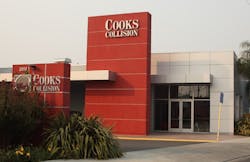Rick Wood’s voice wavered, if only slightly. By the sound of it, the longtime business owner had long ago come to grips with the decision.
Still, he knew things would never be the same for him professionally. And that’s never a pleasant feeling.
“It definitely is emotional; I would be lying if I didn’t say that it was an emotional decision in many ways,” says Wood, a longtime co-owner of California MSO Cooks Collision.
“It was difficult; we had a long history with a lot of employees. But, unfortunately, the world changes, and the economics of the world change.”
What Wood is alluding to is the fact that he and his brother, Don, sold Cooks Collision’s assets to consolidator ABRA Auto Body & Glass in a move that became official Oct. 26. When ABRA purchased the 38-location California MSO, it was viewed by many as one of the biggest deals of the year for consolidators.
The acquisition left ABRA with 396 locations spread throughout 28 states.
And, it left the Wood brothers with a fairly difficult conversation to share with their employees back in late September, when they first informed Cooks Collision’s roughly 800-member workforce of the imminent transaction. For years, members of Cooks Collision had pridefully referred to the MSO as the largest family-owned collision repair company in the U.S.
“The dynamics of the world of collision repair have changed,” Rick Wood notes. “And so, we felt that it was the right time.”
Here’s an inside look into the factors that brought ABRA and Cooks Collision together, in an acquisition that gained the attention of all corners of the collision repair industry.
The Consolidator’s Perspective
When ABRA finalized its acquisition of Cooks Collision, the move was hailed as the largest business transaction in the company’s 34-year history.
On the day the acquisition was finalized, ABRA chief operating officer Jim Kessler sounded both content and confident.
“For us, it’s really the first step in us becoming a national player,” he said. “We actually want to spend the next two years [assessing]: How do we fill out California?
“Then we want to make our way to Texas and Florida, and really fill out a national presence so, when the insurance carriers are looking for someone that has national coverage, we’ll be one of those players.
“Even with Caliber, Boyd and Service King having the same type of strategy … we’re not in a speed contest—for us, it’s making sure that when we do an acquisition we’re actually finding partners that fit.”
When ABRA first sought to become a national brand, the consolidator looked at California as the next logical stop, considering the business already had locations in west coast states Washington and Oregon. And, when ABRA considered MSOs to target Cooks quickly leapt to the fore.
Why, exactly? Because so many employees had remained loyal to Cooks over the years.
“Cooks,” Kessler notes, had “been around since 1979. And, once we met with the Wood family, their culture of how they run their company fit almost identically to ABRA’s.
“It just made it a natural fit for us.”
Below, Kessler breaks down the two biggest pieces to ABRA’s acquisition strategy.
Seek Similar Philosophies.
As ABRA has grown in recent years, Kessler has noticed one uncomfortable truth: On rare occasions, acquisitions haven’t worked smoothly because the two companies’ ideals don’t align. And, when that’s the case, employees of the acquired business tend to head for the exits before long.
In that respect, Cooks appealed to ABRA because of the MSO’s tendency toward solid employee retention. When Kessler analyzed Cooks’ workforce, he noticed several fathers working alongside their sons on the shop floor.
“Rick and Don Wood, they definitely promoted from within,” Kessler notes. “We see a lot of general managers at their locations who might’ve started as a detailer washing a car, and now they’re general managers and have been with the company for a long time.
“When you just look at the tenure of their employees, and their career path of going from an estimator to a production manager, to a general manager, it was really impressive to us.”
Seek Minimal Technological Transitions.
At most ABRA locations, the business management platform of choice is CCC’s. For years, Cooks Collision had utilized Nexius as its main technology vendor.
However, ABRA had made an acquisition of Nexius user Church Brothers Collision Repair in Indiana earlier in 2018. As a result, by the time September rolled around, ABRA’s IT department had already gotten Nexius data loaded into the company’s data warehouse. Thus, ABRA quickly became comfortable with Nexius software.
“As we go about this venture,” Kessler says of acquiring Cooks, “we might make the decision to change to CCC, but we’ll be able to do it a lot more gradually. And we’ll be able to do it phased, instead of saying, ‘OK, all 38 centers all have to be trained and adopt a new business platform on Day 1,’ when they’re already worried about everything else that comes with just being part of a new company.”
The MSO’s Outlook
For years, Cooks Collision’s owners had fielded offers from consolidators. Yet, the MSO’s operators largely focused on strengthening the company’s footprint in northern California.
But, by 2018, the Wood brothers—both in their 50s—viewed consolidation as a more realistic option. And the brothers had always respected ABRA, considering they had long ago been in a 20 Group with the likes of Tim Adelmann, ABRA’s vice president of business development.
So, when ABRA came calling this year, the Wood brothers eventually relented, selling a business they loved.
Ultimately, Wood is at peace with the decision because he knows his former employees will be treated well by ABRA—a company he feels values its employees.
“You really don’t have much of a company,” Wood says, “if you don’t put your time and effort in to the people that work for you.”
ABRA officials have agreed to extend the benefits of Cooks employees through 2019. And, Wood feels confident that his former employees’ jobs are safe for the foreseeable future, especially considering the collision-repair industry’s current demand for positions like body technicians.
So, while the Wood brothers aren’t certain what lies ahead in their professional futures (they have non-compete agreements pertaining to the collision repair industry), Wood largely sounds at peace.
The 58-year-old would offer the following suggestions to any MSO owners who are considering selling to consolidators:
Reach Out to Others That Have Consolidated.
The Wood brothers did plenty of preparation before negotiating with ABRA, Wood says. For instance, he spoke with several colleagues in the industry who had sold their MSOs to consolidators.
Wood suggests reaching out to experienced colleagues in such situations “so that you’re prepared, both financially and emotionally, and psychologically. Because you will feel all of those emotions.
“We’ve had some very good mentors over the years. And, we were both prepared on the personal side, from a financial position and an understanding of where we were—and where we wanted to go as a family.”
Explain to Employees the Immediate Ramifications.
In Wood’s experience, the worst part of an acquisition is the rumors that can shroud such a business deal. That, he says, is something business leaders need to stay out in front of.
“Unfortunately,” Wood says, “you have unscrupulous competitors that try to prey upon people’s insecurities. And so they immediately go after all the employees and tell them how awful it’s going to be, and how they’re going to lose their job.”
But, these days, Wood knows that his former employees are secure in the belief that such rumors are often unfounded. After all, Wood notes, the overall U.S. unemployment rate is the lowest it’s been in nearly half a century.
“Now, are [employees] uneasy because you’re now getting your paycheck from somebody else? Yes, I get that—there’s a human side to that,” Wood acknowledges. “In your new company, are you going to see the owners of the company on a regular basis, like you could with me? No; you can’t duplicate that in a bigger company.”
That’s why Wood made sure to help employees understand the opportunities that are likely to exist for them with ABRA.
Point Out New Opportunities that Exist.
Indeed, while Cooks was closing on its major business deal with ABRA, Wood tried to explain the legitimate positives the transaction presented.
After all, he says, a consolidator like ABRA can offer things that Cooks Collision simply couldn’t guarantee.
“ABRA’s going to be able to provide much better opportunities for the people that have worked for us and been loyal to us for so many years,” Wood says. “They’ll have better opportunities to expand their careers; we could not grow at the pace of the big consolidators.
“And, by [selling to] a company like ABRA—that has plans to expand in California—it puts everybody that works for us at the top of the opportunity list.”

